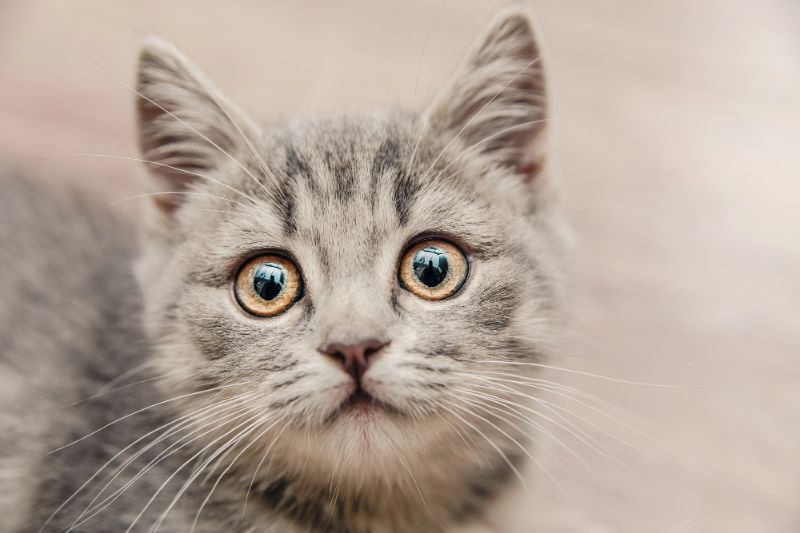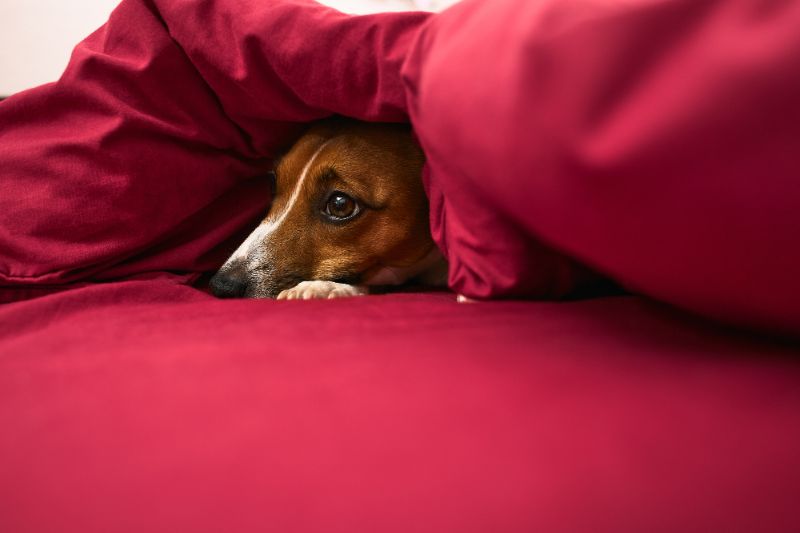The festive season is a joyful time for many, but it can also be a challenging period for pet owners. Between loud gatherings, unfamiliar visitors, and the commotion of Christmas celebrations, your beloved pet may show signs of anxiety and distress. Recognising and addressing the root causes and understanding how to calm an anxious pet during this busy season is essential for ensuring a happy, healthy life.
In this Christmas-themed guide, we’ll explore practical, effective strategies to calm anxious pets—including dogs, cats, and small animals—tailored to their specific needs and behaviours. Let’s dive into how to help your pet feel relaxed and reassured throughout the festivities!
How to calm an anxious pet – recognise anxiety
Before addressing how to calm your pet, it’s essential to understand the signs of stress and anxiety. While your pet can’t tell you what’s bothering them, they communicate emotions through their behaviour and body language. Keep an eye out for the following behaviours, which may be heightened during the often manic festive season:
- Restlessness: Pacing or inability to settle.
- Destructive behaviour: Chewing, scratching, or digging.
- Vocalisation: Excessive barking, meowing, or squealing.
- Hiding: Seeking out quiet spots to avoid interaction.
- Changes in appetite: Refusing food or overeating.
By recognising these signs early, you can implement calming strategies to help your pet cope with the season’s stresses.
How to calm an anxious dog
Dogs, known for their loyalty and close bond with their owners, are particularly susceptible to anxiety during the Christmas holidays. More frequent separation due to owners coming and going, loud parties, carolers, fireworks and environmental changes can all contribute to stress. Here’s how to help:
1. Establish a routine
Consistency is key, even during the holidays. Feed, walk, and play with your dog at regular times to create a sense of security. This routine helps them feel more in control despite the festive hustle and bustle.
2. Create a safe space
Giving your dog a comfortable, quiet place to retreat when feeling overwhelmed can make all the difference. This could be a cosy corner with their favourite bed and toys. Even calming music has been known to help dogs feel secure and comforted in their safe zone. Some recent research by Queens University found that classical music helps to settle dogs when they are home alone.
3. Exercise and mental stimulation
Daily walks and interactive playtime are more important than ever. A brisk winter walk not only tires out your dog but also provides a break from the holiday chaos. Indoors, keep them occupied with puzzle toys or festive-themed games like hide-and-seek with holiday treats.
4. Distract, distract, distract!
Sometimes, the best way to manage anxiety in your dog is to redirect their attention to something engaging. During moments of stress, introduce a new toy, a food puzzle, or a chew that will capture their focus. These activities not only provide mental stimulation but also create positive associations that can help diminish their fear or nervousness. This approach works particularly well during busy holiday moments, like when guests arrive or when fireworks are going off!

How to calm an anxious cat
Though cats are famously independent, they can also experience anxiety during the festive season. Changes like new decorations, unfamiliar guests, or even a Christmas tree can be stress-inducing.
1. Offer elevated spaces
Cats often find comfort in high places where they can observe their surroundings. Providing vertical space like cat trees or shelves can help your cat feel secure and escape the chaos of presents, visitors and Christmas tree lights if they wish!
2. Create a calm environment
Creating a quiet, peaceful space for your cat, complete with cosy bedding and scratching posts, can work wonders. Many cats respond positively to calming pheromone diffusers like VETIQ Serene Calming Diffuser to soothe their nerves, and for additional support, VETIQ Serene Calming Drops provide a natural way to combat tension and stress, offering a natural, drowsiness-free way to relax your cat during busy Christmas moments.
3. Interactive playtime
Even during the holiday rush, make time for interactive play. Wand toys, laser pointers, or a festive crinkle ball can help release pent-up energy and distract your cat from stressors.
4. Routine and familiarity
Stick to regular feeding times and avoid rearranging your cat’s environment too much. If you’re adding festive lights and decorations, introduce them gradually to help your cat adjust without feeling overwhelmed.
How to calm an anxious pet: small animals
Small animals like rabbits, guinea pigs, and hamsters are particularly sensitive to noise, new smells, and sudden changes—all of which are common during Christmas.
1. Provide a quiet environment
Place their enclosure in a low-traffic area of your home, away from noisy parties or bustling kitchens full of hungry Christmas diners! Consider covering part of their habitat with a blanket to give them an added sense of security.
2. Handling with care
Gentle, consistent handling can help reduce festive anxiety in small pets, but it’s important not to overdo it. Allow them to approach you on their terms and avoid handling when they seem frightened.
3. Safe hiding places
Ensure your small pet’s enclosure has plenty of places to hide. Many small animals feel secure when they can retreat into a small, enclosed space, such as a tunnel or hut when they feel threatened.
4. Balanced diet and enrichment
Keeping small animals occupied with chew toys, tunnels, and a balanced diet helps distract them from the Yuletide busyness. Chewing is a natural calming activity for rabbits and guinea pigs, so provide them with plenty of safe chew options. Another option is to give your small animal a healthy treat that will also double up as a way to calm their nervous system. VETIQ Healthy Bites Serene Calming for Small Animals does exactly that, containing chamomile and lemon balm to help ease stress and anxiety.
When to seek professional help
While many pets respond well to home remedies and calming products, some cases of anxiety may require some veterinarian intervention. If your pet’s anxiety persists despite your best efforts or is accompanied by severe behavioural changes, consult your veterinarian. They can rule out any underlying health issues and may recommend behavioural therapy or medication.
How to calm an anxious pet with VETIQ’s Serene Calming Range
Christmas can be a challenging time for pets, but with the right strategies and products, it’s possible to create a more peaceful environment. The Serene Calming range offers a variety of solutions for dogs, cats, and small animals, ensuring pets of all kinds stay calm during the holidays:
- Serene Calming Ointment: When unexpected events arise, like fireworks or noisy gatherings, Serene Calming Ointment provides fast relief within 20 minutes by releasing a calming pheromone. Safe for all breeds and ages, it’s easy to use and can be applied as needed. Help your dog stay calm this Christmas with our award-winning Serene Calming Ointment. This all-natural, sedative-free solution provides rapid relief from dog anxiety. Voted PetQuip Product of the Year 2024, it’s the perfect calming aid to keep on hand for the festive season!
- Serene Calming Tablets: Help your pet stay calm with Serene Calming Tablets, ideal for stress caused by fireworks, travel, or loud noises during Christmas. These natural, non-sedating tablets soothe nervous cats and dogs and are safe for long-term use. Keep a bottle on hand to help your pet feel secure throughout the holiday season.
- Serene Calming Drops: Support your pet’s calm behaviour with Serene Calming Drops, a natural supplement for dogs and cats. Containing essential amino acids and vitamins, these drops reduce stress without causing drowsiness. Perfect for maintaining peace during the excitement of Christmas guests and celebrations.
- Serene Calming Portable Diffuser: The Serene Calming Portable Diffuser is a plug-free device that releases calming pheromones to relax your cat naturally. Ideal for reducing scratching, marking, and meowing, it covers up to 65m² and lasts 30 days. Portable and reusable, it’s a simple way to keep your cat calm during the festive period.
- Healthy Treats Serene Calming for Small Dogs & Puppies: Calm your small dog or puppy with Healthy Treats Serene Calming. Infused with chamomile and lemon balm, these low-calorie treats help reduce anxiety during common Christmas stressors like noise and new visitors. They’re also great for reward-based training and bonding.
- Healthy Bites Serene Calming for Cats: Healthy Bites Serene Calming for Cats are crispy cereal shells with a creamy centre, made with chamomile, lemon balm, and ginger oil to naturally ease stress. Free from artificial ingredients, they include added vitamins to promote relaxation, making them perfect for festive-season comfort.
- Healthy Bites Serene Calming for Small Animals: Even small pets deserve calm during Christmas. Healthy Bites Serene Calming for Small Animals are tasty treats with chamomile and lemon balm to ease anxiety. With a crispy shell and creamy centre, they’re a healthy, delicious way to comfort rabbits, guinea pigs, and hamsters.
With the VETIQ Serene Calming range, you can ensure your pets feel safe and relaxed, no matter what Christmas brings. From tasty treats to fast-acting ointments, these products offer natural, effective ways to reduce anxiety and keep your furry friends happy during the most wonderful time of the year. Give your pet the calm they deserve this Christmas—because a relaxed pet is a happy pet!







